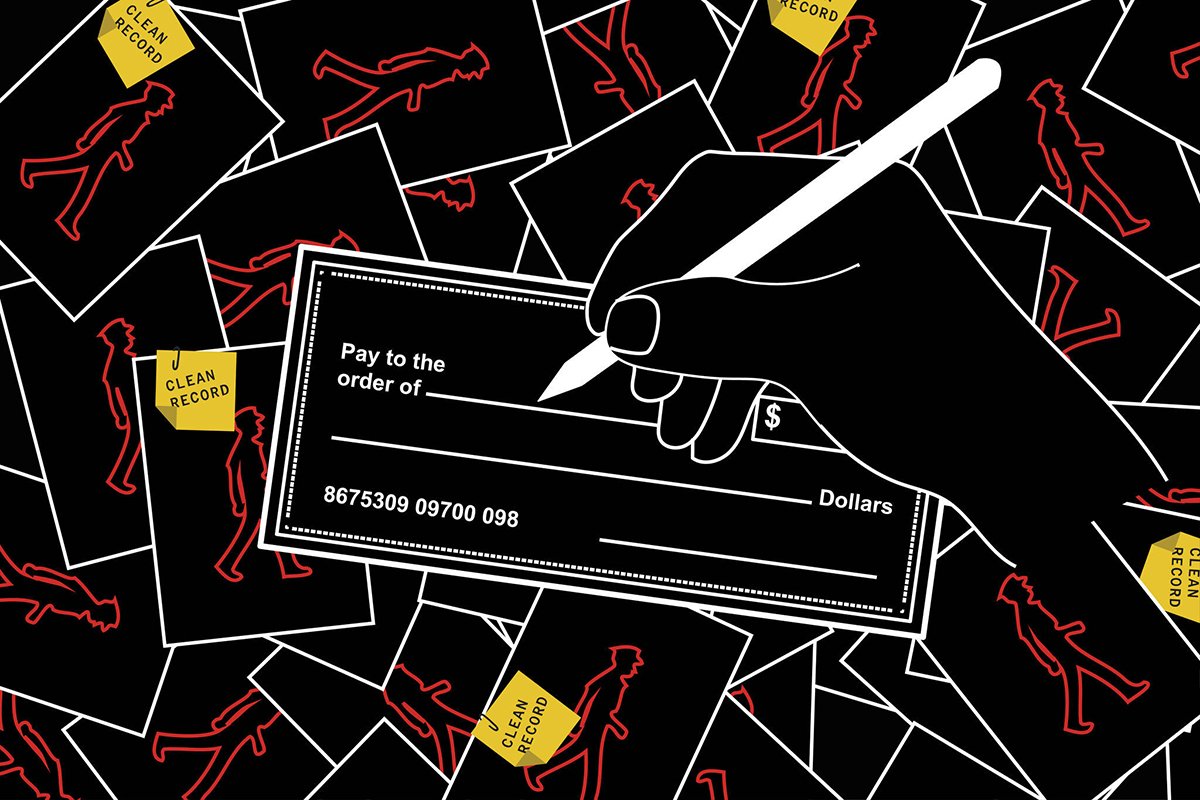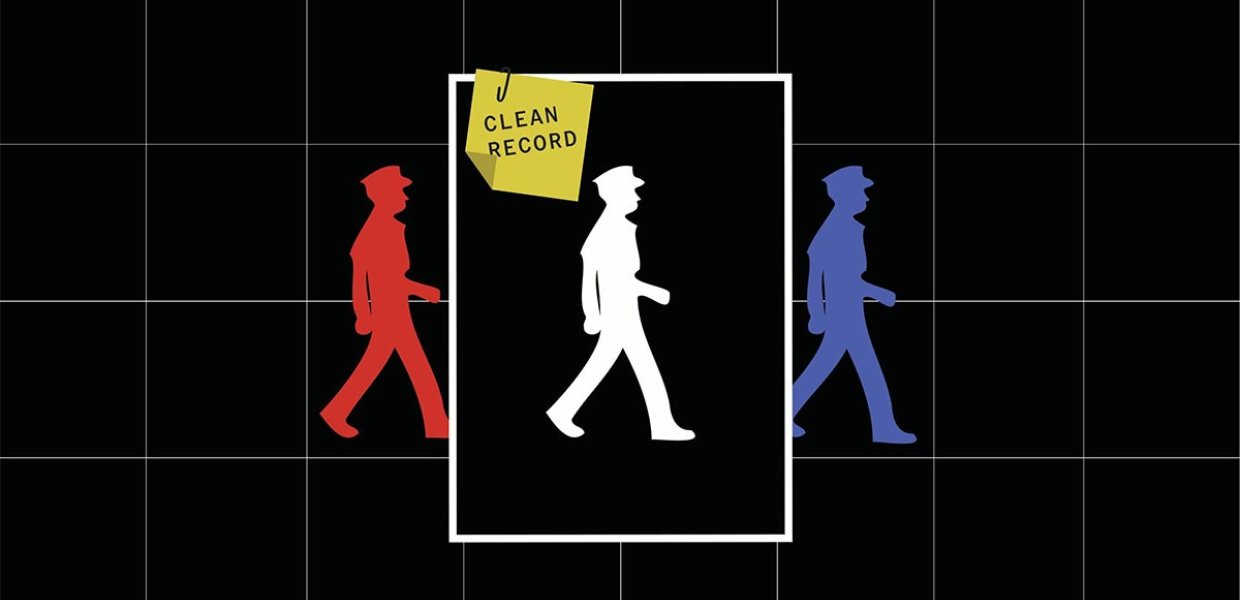In 2019, Katey Rusch was a student in the Investigative Reporting Program at the University of California, Berkeley’s Graduate School of Journalism. She was researching police departments that had hired officers who had past records of misconduct and appeared to have been terminated from previous jobs.
But when she talked to those cops, they denied having been fired and challenged her to check her sources.
Challenge accepted.
Following five years of dogged research, Rusch and her reporting partner, fellow UC Berkeley Journalism alumna Casey Smith, delivered a bombshell last September: Hundreds of local law enforcement agencies throughout California had systematically used so-called “clean-record agreements” with officers accused of misconduct.
“It was the language of these secret deals that drew me in,” Rusch said. “In black and white, the first set of agreements I saw spelled out a government-sanctioned cover-up. I had to know if these agreements were an outlier or commonplace.”
The separation agreements excused the accused cops from any wrongdoing but kept the very existence of those accusations secret — even from other law enforcement agencies that might consider giving them a job. In many cases, those officers were granted disability pensions for injuries that had been challenged by their employers, entitling them to hundreds of thousands, or even millions, of dollars in payments.
One such officer had been investigated for lying in a police report while working for the Ventura Police Department, a fireable offense. Instead, he received a secret separation agreement and a $64,000 annual pension for PTSD that he claimed was caused by “pervasive harassment” from fellow officers because of his Mormon faith. He went on to become a deputy commissioner in New York City’s corrections system, earning $195,000 a year.

“In an era of complex global challenges and rapid misinformation, investigative journalism is more vital than ever,” USC Annenberg Dean Willow Bay said. “This year’s winner, along with all of the outstanding entries, exemplifies the journalistic rigor, intrepid reporting, dedication and impact that define the very best in the field. We are honored to once again partner with the Ring Foundation to honor their work, which not only informs the public but also sparks accountability and justice where it’s needed most.”
To expose the troubling practice of using confidential settlements to bury officer misconduct, Rusch and Smith leveraged a 2019 law that opened access to certain police records for the first time, filing public records requests to 501 law enforcement agencies, big and small, throughout California. When they encountered obstacles, they found back doors to get at the data, pulling records such as adjudicated workers compensation claims to help color in the picture of a system that rewarded cops for bad behavior and kept the public in the dark. They also conducted more than 250 interviews as part of their exhaustive reporting process.
“What kept us going was the people,” Rusch said. “The police chiefs and sheriffs who had unknowingly hired officers without knowing the full extent of their backgrounds. The community members had suffered at the hands of these officers at their next agency or their next job. This kept us up at night and gave us the motivation to continue.”
All told, the duo found that 163 law enforcement agencies in California had entered into the secret deals with nearly 300 officers and 108 of them had landed subsequent jobs at other police departments, as corrections officers or as security guards.
The impact was immediate and sweeping. Soon after publication, California’s state pension system manager launched an investigation into all the disability pensions identified in the reporting. As a direct result of Rusch and Smith’s work, more than a half-dozen officers either lost their jobs, their law enforcement license, are under investigation to have their license revoked, or were eliminated from consideration for a chief’s position.
“We are incredibly honored to have our work recognized with the Selden Ring Award, and humbled to be in the company of the award’s past winners whose work champions the highest levels of accountability and transparency,” Smith said. “This recognition is a powerful affirmation of the importance of undertaking this long-haul project. We hope this honor can help to eliminate the ability of police agencies to bury misconduct.”
This year’s Selden Ring Award panel included returning judges Sarah Stillman (lead judge), staff writer, The New Yorker; Ken Bensinger, media reporter, The New York Times; Manny García, editor in chief, Houston Landing; Geoffrey King, executive editor, Open Vallejo; Topher Sanders, reporter, ProPublica; with first-time judges Linda Villarosa, contributing writer, The New York Times Magazine; and Bernice Yeung, managing director/managing editor, Investigative Reporting Program, University of California, Berkeley.
“We are deeply grateful for the outstanding work of our judging panel,” said Gordon Stables, director of USC Annenberg’s School of Journalism. “In a time when the media landscape is evolving rapidly and facing unprecedented challenges, it’s truly inspiring to see top reporters and editors dedicating their time to honor and amplify the achievements of their peers. The panel took on the monumental task of selecting from a highly competitive group of 69 entries, each representing the very best of investigative journalism and its impact over the past year.”
Since 1989, the Ring Foundation has partnered with the USC Annenberg School of Journalism to present the Selden Ring Award for Investigative Reporting. The $50,000 annual award was established with the support of Southern California businessman and philanthropist Selden Ring. It underscores the critical importance of investigative journalism in today’s society.

The Selden Ring Award judges also recognized the work of two finalists and gave one special citation.
Reuters, The Starving World
In “The Starving World,” Reuters offers a devastating and sweeping look at the failures of the global response to famine. The judges wrote: “This innovative and stunning report interrogates a complex system, revealing the ways that the current international response to starvation falters under conditions of war and conflict — the most common cause of famine today.” When international authorities struggled to collect mortality data in conflict zones to identify cases of deadly starvation, Reuters devised a workaround. By acquiring and analyzing hundreds of satellite images, verified by on-the-ground accounts, the reporters identified a growth in graves at Sudanese refugee camps. International authorities subsequently cited Reuters’ analysis when it acknowledged the existence of a famine in five places across the northeastern African country in 2024, triggering global aid. Through deep sourcing and exclusive access to internal aid agency documents, a team of 20 Reuters reporters also illuminated the role of governments, insurgent groups and even international aid organizations in the diversion or looting of life-saving humanitarian aid to Ethiopia, Gaza and Myanmar.
ProPublica, Life of the Mother
Two years after the Supreme Court overturned the constitutional right to abortion, Kavitha Surana, a ProPublica national reporter, did what the government had neglected to do: revealed who was dying as a result of state laws banning abortion and helped us to understand why. Surana, along with Cassandra Jaramillo and Lizzie Presser, requested death records from over a dozen states, and eventually discovered that the laws were not just stifling physicians, nurses and midwives from offering care for women seeking abortions, but also impeding these providers from treating women suffering miscarriages and stillbirths. Far too often, this led to death. The judges wrote, “Beyond the data, this investigation stands out for its sensitive and heart-breaking interviews with family members of women who had died, documenting the under-acknowledged real-life consequences of abortion bans.” The story and photographs gave courage to grieving relatives to step into the spotlight at the Democratic National Convention to tell their stories, and since publication lawmakers have filed more than a dozen bills to expand abortion access in at least seven states and to examine the cost abortion bans have had on maternal outcomes; some of the bills were drafted in direct response to ProPublica’s reporting.
Special Citation — Associated Press, Frontline, and the Howard Center for Investigative Journalism programs at the University of Maryland and Arizona State University, Lethal Restraint
The judges agreed that this investigation stood out for its highly collaborative approach, involving journalism students at two universities. They also recognized the compelling databases the team created, noting how the findings were generously shared with other news outlets nationwide, making way for additional, targeted probes at the local level.
This three-year investigation exposed and meticulously catalogued fatal encounters by police with the public, a vital and significant undertaking that no government entity had ever done. To accomplish that feat, the team traveled the country, filed 7,000-plus records requests, and unearthed an additional 270 deaths by “less-lethal force” that did not appear in databases traditionally cited by researchers, policymakers and journalists. As part of the expansive multi-platform collaboration, the journalists created an immersive, close-up visual experience that uses law enforcement video, audio, interviews, and data visualizations to tell the stories of people who died while being restrained by law enforcement, sometimes after they had sought medical or mental health help. Finally, the journalists made their records available to other news outlets who used its database to find cases and expand the reporting in places like Milwaukee, El Paso, Atlanta, Las Vegas, and beyond.
Members of the 2025 Selden Ring Award judging panel recused themselves in cases when entries from their outlets were under consideration, including Bernice Yeung, who recused herself from discussion or voting for “Right to Remain Secret.”
